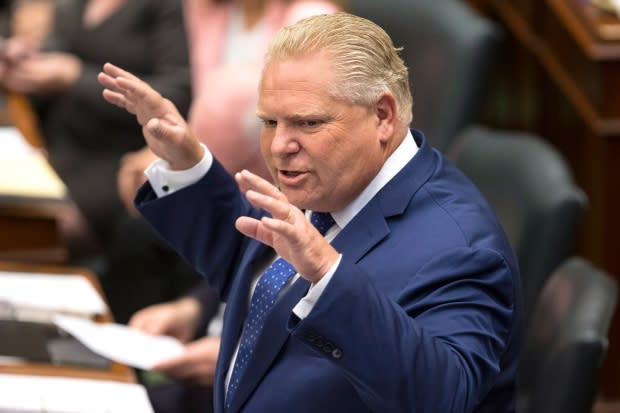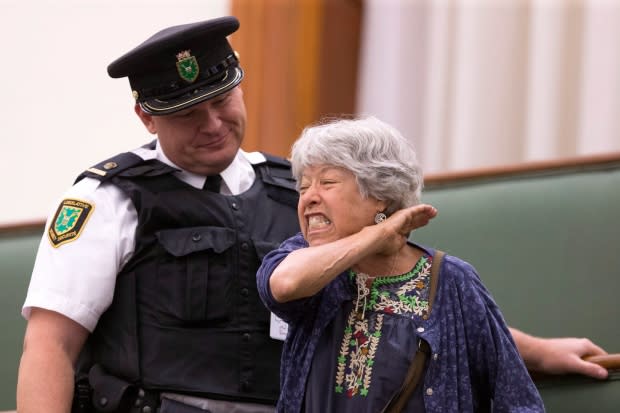Doug Ford's new Toronto city council-slashing bill extends nomination window
Premier Doug Ford's new bill to slash the size of Toronto city council extends the nomination period for candidates until two days after the legislation receives royal assent.
That means most Torontonians likely won't know who's seeking their vote until just one month until election day, which remains Oct. 22.
The change also allows a number of high-profile incumbent councillors who hadn't signed up to enter the race.
Now called the Efficient Local Government Act, the new bill also states that the city will no longer be required to hold an advance vote. Early polls were set to open on Oct. 10, according to the city's website.
The bill also includes the constitutional notwithstanding clause, which allows it to override the ruling of an Ontario judge that blocked the previous version of the Better Local Government Act this week after deeming it unconstitutional. This marks the first time the notwithstanding clause has been used at Queen's Park.
However, the province won't be able to pass the legislation until next week at the earliest, and it's possible the Official Opposition will try to delay the passage of the new law.
Toronto's current city council, meanwhile, is set to hold an emergency meeting on Thursday to debate its next steps.
NDP MPPs booed, slammed their desks and chanted "shame" as Steve Clark, the minister of Municipal Affairs and Housing, attempted to introduce the bill, delaying the process as every single one of them was kicked out of the legislature.
Clark eventually tabled the legislation, which easily passed its first reading, although a dozen PC MPPs missed the vote.
A timeline of Toronto's election turmoil
May 1: City of Toronto opens nominations for mayor and councillors using the 47-ward system.
June 7: Ford's PCs win majority in Ontario election.
July 26: News breaks that Ford, who served one term on city council, plans to align Toronto's ward map with provincial ridings, ensuring there will be 25, not 47, councillors after the Oct. 22 municipal election.
July 27: Nominations for mayor close, as scheduled. Jennifer Keesmaat files last-minute entry.
Aug. 14: Government passes Better Local Government Act. "The people want smaller government," Ford declares on council floor.
Aug. 20: Toronto city clerk reopens councillor nominations under 25-ward system, sets a Sept. 14 deadline to enter race. No new candidates allowed to enter mayoral race.
Sept. 10: Ontario Judge blocks Ford's Better Local Government Act. Toronto's city clerk immediately starts planning to run 47-ward election. But then, Ford announces plan to use constitutional notwithstanding clause to override judge's ruling.
Sept. 11: Toronto city clerk closes nominations completely, leaving a number of incumbent councillors wondering if they'll be allowed to run.
Sept. 12: Government introduces new Efficient Local Government Act.
Government also files court appeal
During a tense day at Queen's Park that saw some members of the public handcuffed after staging a protest inside the legislature, PC ministers appeared firmly behind Ford's plans.
Attorney General Caroline Mulroney — whose father, former prime minister Brian Mulroney, has criticized the use of the notwithstanding clause — confirmed the government is appealing the Ontario Superior Court's ruling.
"Our government believes it was wrongly decided," she told reporters, adding the PCs are moving quickly to ensure Torontonians have clarity ahead of the election.
In the appeal, the government argues Justice Edward Belobaba erred in his judgement that the Better Local Government Act infringed on charter rights.
Belobaba ruled that because Bill 5 was passed in the middle of an election campaign it breached the freedom of expression of candidates. The judge also stated the rights of voters' were infringed upon because changing ward sizes — some wards will go from 61,000 people per ward to almost 110,000 — limits their effective representation.
In its appeal, the government argues effective representation, as it's laid out in the charter, only applies to provincial and federal elections.
The government also rejects the judge's assertion that it's limiting what candidates can say. "The Act does not limit any attempt to convey meaning in purpose or effect, let alone substantially interfere with the freedom of expression of candidates or any other person," the appeal states.
Don Eady, a lawyer representing several candidates challenging the previous attempt to cut city council, is holding out hope that there will be a 47-ward election.
"But I think that's being compromised by the actions of the provincial government," he told CBC Toronto.
Province working with city clerk, minister says
Steve Clark, the minister of Municipal Affairs and Housing, said the government is working with the city clerk's office to ensure the election runs smoothly.
Clark also dismissed reporters' questions about why his government was intent on ramming through a change it hadn't campaigned on during Ontario's spring election.
"We're moving forward," he said.
Ford has promised that there will be a free vote on the Efficient Local Government Act.


